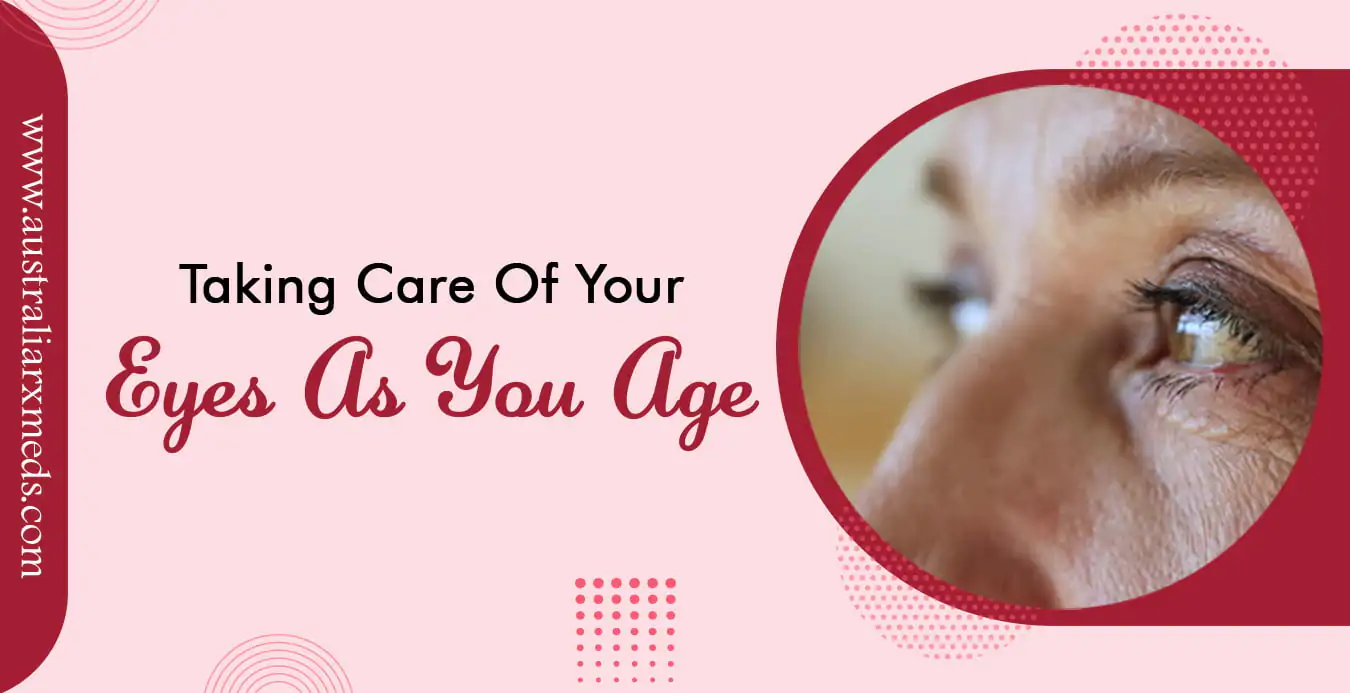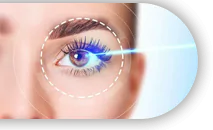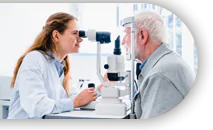Taking Care of Your Eyes as You Age
By Australiarxmeds, Jan-31-2024

Different changes occur in our bodies as we age gracefully. The aging process can bring about a range of eye-related issues, from presbyopia to age-related macular degeneration.
However, adopting a proactive approach to Eye Care can significantly mitigate these concerns and contribute to maintaining optimal vision throughout the years. In this comprehensive guide, we will explore various aspects of Taking Care of Your Eyes as You Age.
👁🗨Understanding the Aging Eye

The aging process affects many parts of our bodies, including our eyes. Presbyopia, a condition where the eye’s lens loses its adaptability and becomes harder to focus on close objects, is one of the most common age-related visual impairments.
Additionally, the risk of developing conditions like cataracts, glaucoma, and age-related macular degeneration increases with age. Regular eye exams are important for the early detection and treatment of these conditions.
Wearing protective glasses and avoiding cigarette smoke can also help reduce the risk of age-related vision loss. Eating a healthy, balanced diet can also help maintain Good Eye Health. Taking supplements like lutein and zeaxanthin can also help reduce the risk of age-related vision loss.
🍽️Maintaining a Healthy Diet for Eye Health

As we age, maintaining eye health requires a well-balanced and nutrient-dense diet. Diets rich in Vitamins, Vitamins C, and E, zinc, zeaxanthin, lutein, and omega-3 fatty acids are associated with a lower risk of age-related vision problems.
Leafy green vegetables, citrus fruits, nuts, and fatty fish are excellent choices for promoting eye health. Additionally, staying adequately hydrated contributes to overall eye comfort and lubrication. Eating a balanced diet and drinking plenty of water can help protect our eyes as we age.
Regular eye check-ups are also important to identify any potential problems early. Make your nighttime eye care routine more effective with 9 PM Eye Drop, a soothing solution that relieves dryness and promotes overnight hydration.
🧘🏻♀️The Importance of Regular Exercise

Regular Physical Activity is not only beneficial for cardiovascular health but also plays a role in maintaining healthy eyes. Exercise helps regulate Blood Flow, including blood flow to the eyes, which can contribute to the prevention of certain eye conditions.
Engaging in activities such as walking, swimming, or yoga can have a positive impact on overall eye health. Exercise can also help to reduce intraocular pressure, which can lead to glaucoma.
Protecting Your Eyes from Harmful UV Rays

Prolonged exposure to Ultraviolet (UV) rays is a risk factor for various eye conditions, including cataracts and macular degeneration. As we age, our eyes become more susceptible to UV damage. Wearing sunglasses that block both UVA and UVB rays is essential when spending time outdoors. Additionally, wide-brimmed hats can provide additional protection, reducing the overall exposure of your eyes to harmful sunlight.
Prioritizing Eye Safety in Daily Activities

Accidents and injuries can pose significant threats to eye health, and as we age, the risk of falls and mishaps tends to increase. Ensuring proper lighting at home, using handrails on stairs, and wearing protective eyewear during activities that pose potential risks can help prevent accidents that may lead to eye injuries.
Regular vision check-ups can also detect potential issues early on, allowing for prompt intervention. Taking these measures can help protect our eyes as we age. It is also important to be aware of the signs and symptoms of eye injuries and to seek medical attention if necessary. Roc Retinol Correxion Eye Cream brightens, smoothes, and rejuvenates the eyes.
Managing Digital Eye Strain

Prolonged screen time has become inevitable for many. However, prolonged use of digital gadgets can lead to digital eye strain, which causes symptoms such as dry eyes, migraines, and impaired vision. To reduce digital eye strain, use the 20-20-20 rule: after 20 minutes, take a 20-second break to stare at anything 20 feet away. Adjusting screen brightness, utilizing blue light filters, and working in an ergonomic environment can all help to prevent eye strain.
😴The Role of Adequate Sleep in Eye Health

Quality sleep is crucial for overall health, including the well-being of our eyes. Chronic sleep deprivation has been linked to an increased risk of conditions such as glaucoma and dry eyes. Establishing a consistent sleep routine and ensuring a comfortable sleep environment can contribute to better Eye care.
If sleep disturbances persist, it is advisable to consult a Healthcare Professional for guidance. Frequent exercise might also enhance the quality of your sleep. Eating a balanced diet and avoiding caffeine and alcohol can also help to improve sleep quality.
✔️Regular Eye Check-ups and Vision Correction

Regular ocular examinations become more crucial as we age. Vision can change gradually, and many eye conditions may develop without noticeable symptoms in their early stages. Comprehensive eye exams can detect issues early on, allowing for timely intervention. Combigan Eye Drop 5ml provides relief for those with glaucoma or ocular hypertension while ensuring clear, comfortable vision.
🚭Quitting Smoking for Better Eye Health

Smoking is a well-established risk factor for several Eye Conditions, including age-related macular degeneration and cataracts. The harmful substances in tobacco smoke can damage the delicate blood vessels in the eyes, leading to vision impairment. Quitting smoking not only benefits overall health but also significantly contributes to preserving eye health as we age. Quitting smoking can also help reduce the risk of glaucoma, optic nerve damage, and diabetic retinopathy.
Seeking Professional Advice for Eye Conditions

If you experience changes in your vision, eye discomfort, or any unusual symptoms, it is essential to seek professional advice promptly. Delaying or neglecting symptoms can lead to the progression of underlying conditions. An ophthalmologist or optometrist can conduct a thorough examination and recommend appropriate treatments or interventions based on your specific needs.
📢 Final Words
➯ Taking care of your eyes as you age involves a combination of lifestyle choices, proactive measures, and regular professional care. From maintaining a healthy diet and engaging in regular exercise to protecting your eyes from UV rays and digital strain, every effort contributes to preserving optimal vision.
➯ By adopting these practices and prioritizing regular eye check-ups, you can enjoy a clear and vibrant outlook on life, appreciating the world around you for years to come.

